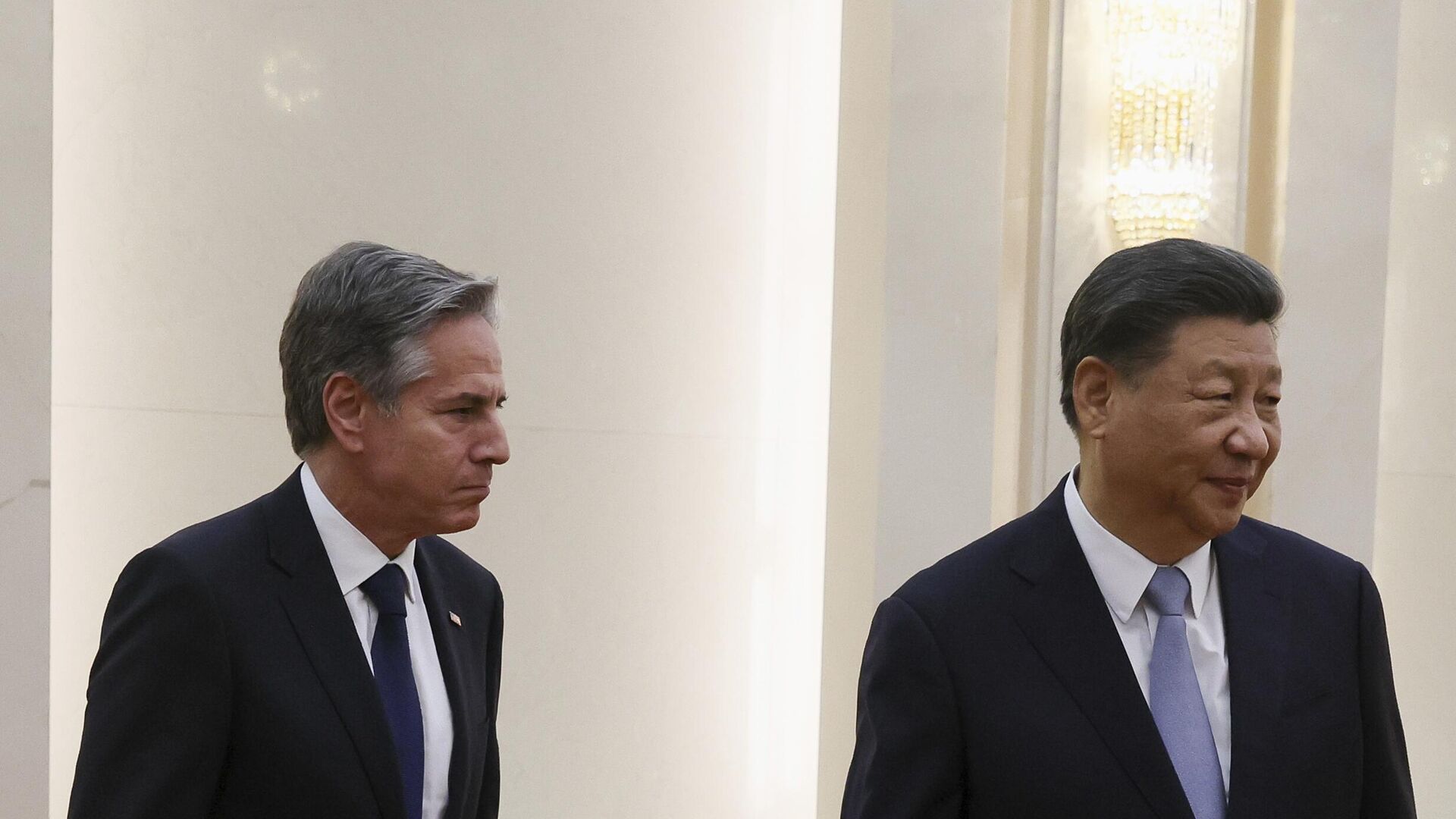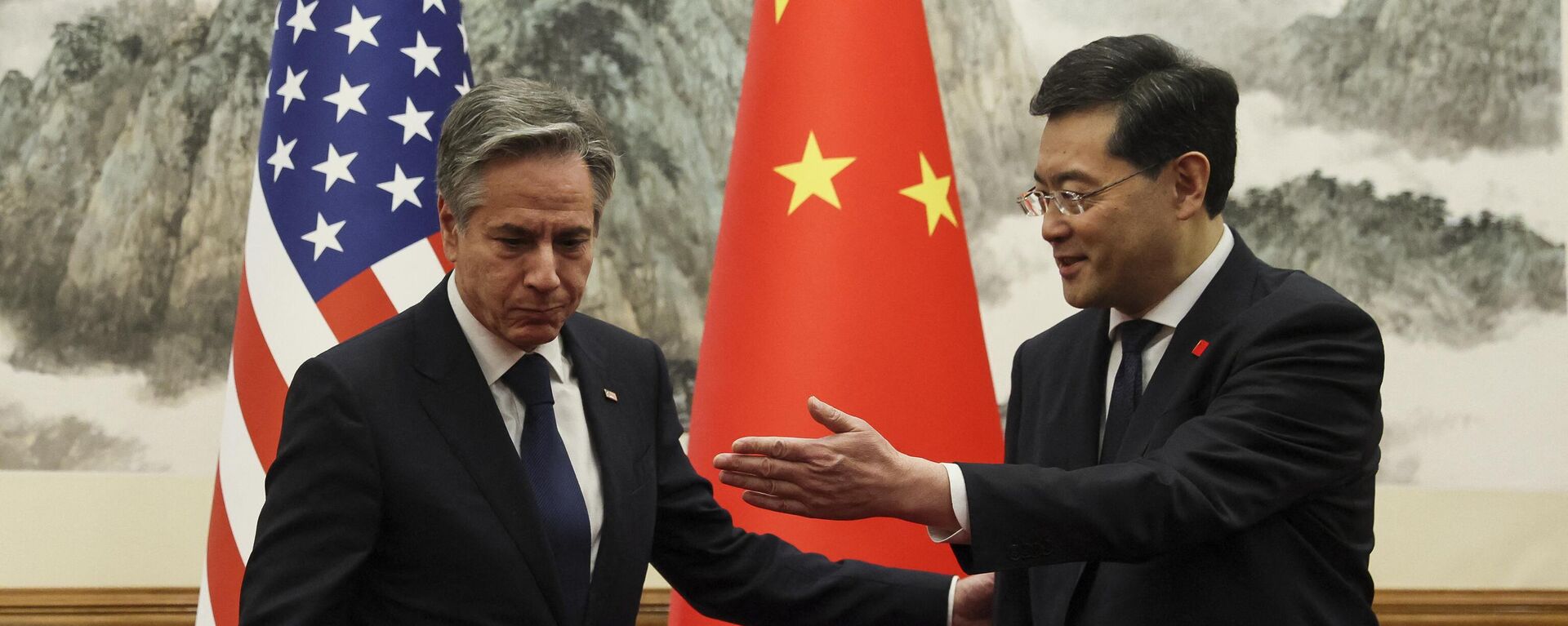https://sputnikglobe.com/20230620/blinken-blinked-us-foreign-policy-chiefs-fruitless-flight-to-beijing-1111328207.html
Blinken Blinked: US Foreign Policy Chief's Fruitless Flight to Beijing
Blinken Blinked: US Foreign Policy Chief's Fruitless Flight to Beijing
Sputnik International
Antony Blinken had hoped reassert a constructive US role in the Pacific on his trip to China. Dr Radhika Desai and journalist KJ Noh said he could only low-hanging diplomatic fruit.
2023-06-20T17:50+0000
2023-06-20T17:50+0000
2023-06-20T17:58+0000
americas
antony blinken
beijing
qin gang
china
taiwan
foreign ministry
us house of representatives
https://cdn1.img.sputnikglobe.com/img/07e7/06/13/1111301073_0:84:2471:1474_1920x0_80_0_0_dbbef7a080e91a83762282b162518043.jpg
At a press conference following meetings with Chinese Foreign Minister Qin Gang and President Xi Jinping on Monday, Blinken backed down from recent attempts by US House of Representatives speakers Nancy Pelosi and Kevin McCarthy to encourage Taiwan to assert formal independence from mainland China.“We do not support Taiwan independence," Blinken said. "We remain opposed to any unilateral changes to the status quo by either side."He also appeared to abandon Washington's claims that China was supplying arms or munitions to Russia for its military operation in Ukraine, finally accepting China's repeated refutations.University of Manitoba professor Dr. Radhika Desai told Sputnik that the Biden administration "probably had to make some sort of visit" to China, even though the last scheduled meeting in February was canceled after the balloon incident.She said the Chinese government was being "morally big" by tolerating Blinken.Beijing's graciousness stemmed from its concern for the world at large, she said."The United States and China are nuclear powers. They are the two big superpowers of the world," Desai stressed. "For them not to talk means that you have a very dangerous world situation, and the Chinese are committed not to bring the world to the edge of nuclear disaster."The academic said the tensions between the two nations were just a symptom of declining US influence in the world.Blinken was also forced to admit that he had failed in his aim of re-opening a hotline between the two countries' armed forces, a "difficulty" which Yang Tao, Foreign Ministry director-general of the Department of North American and Oceanian Affairs, said was due to US sanctions.Journalist and expert on the political economy and geopolitics of the Asia-Pacific KJ Noh told Sputnik that meant the two nuclear powers "don't have words to communicate with." Overall, the Asia expert said, Blinken's trip had meagre results because "the baseline was very low. It was a cold reception.""The key statement was that we agreed to continue to talk," Noh said. "We talked and we agreed to continue talking, which in itself is not a bad thing, although it really is the lowest of the lowest-hanging fruit."Beijing's message to Washington was to abode by the "five NOs" they agreed to at the 2022 G20 leaders' summit in Bali, Indonesia.For more in-depth analysis of current affairs, tune in to our Sputnik Radio shows.
https://sputnikglobe.com/20230619/blinken-goes-to-beijing-us-secretary-of-state-visits-china-for-first-time-in-five-years-1111272414.html
americas
beijing
china
taiwan
Sputnik International
feedback@sputniknews.com
+74956456601
MIA „Rossiya Segodnya“
2023
James Tweedie
https://cdn1.img.sputnikglobe.com/img/07e4/08/1c/1080307270_0:3:397:400_100x100_80_0_0_7777393b9b18802f2e3c5eaa9cbcc612.png
James Tweedie
https://cdn1.img.sputnikglobe.com/img/07e4/08/1c/1080307270_0:3:397:400_100x100_80_0_0_7777393b9b18802f2e3c5eaa9cbcc612.png
News
en_EN
Sputnik International
feedback@sputniknews.com
+74956456601
MIA „Rossiya Segodnya“
Sputnik International
feedback@sputniknews.com
+74956456601
MIA „Rossiya Segodnya“
James Tweedie
https://cdn1.img.sputnikglobe.com/img/07e4/08/1c/1080307270_0:3:397:400_100x100_80_0_0_7777393b9b18802f2e3c5eaa9cbcc612.png
us secretary of state antony blinken, chinese president xi jinping, us recognition of chinese sovereignty over taiwan, will the us go to war with china over taiwan?
us secretary of state antony blinken, chinese president xi jinping, us recognition of chinese sovereignty over taiwan, will the us go to war with china over taiwan?
Blinken Blinked: US Foreign Policy Chief's Fruitless Flight to Beijing
17:50 GMT 20.06.2023 (Updated: 17:58 GMT 20.06.2023) Antony Blinken had hoped to reassert a constructive US role in the Pacific on his trip to China. Two experts both said he could only pick low-hanging diplomatic fruit, however.
At a press conference following meetings with Chinese Foreign Minister Qin Gang and President Xi Jinping on Monday,
Blinken backed down from recent attempts by US House of Representatives speakers Nancy Pelosi and Kevin McCarthy to encourage Taiwan to assert formal independence from mainland China.
“We do not support Taiwan independence," Blinken said. "We remain opposed to any unilateral changes to the status quo by either side."
He also appeared to abandon Washington's claims that China was supplying arms or munitions to Russia for its military operation in Ukraine, finally accepting China's repeated refutations.
University of Manitoba professor Dr. Radhika Desai told
Sputnik that the Biden administration "probably had to make some sort of visit" to China, even though the last scheduled meeting in February was canceled after the
balloon incident.
She said the Chinese government was being "morally big" by tolerating Blinken.
"China, even though it doesn't have to do it, is doing these things, is extending the olive branch," Desai said. "It's doing diplomacy as it should be done."
Beijing's graciousness stemmed from its concern for the world at large, she said.
"The United States and China are nuclear powers. They are the two big superpowers of the world," Desai stressed. "For them not to talk means that you have a very dangerous world situation, and the Chinese are committed not to bring the world to the edge of nuclear disaster."
The academic said the tensions between the two nations were just a symptom of declining US influence in the world.
"Why is the United States facing this conflicted situation vis-a-vis China?" Desai asked. "Because it is losing power."
Blinken was also forced to admit that he had failed in his aim of re-opening a hotline between the two countries' armed forces, a "difficulty" which Yang Tao, Foreign Ministry director-general of the Department of North American and Oceanian Affairs, said was due to US sanctions.
Journalist and expert on the political economy and geopolitics of the Asia-Pacific
KJ Noh told
Sputnik that meant the two nuclear powers "don't have words to communicate with."
"When you don't have the words, you only have actions to communicate with or actions to interpret. And military actions can always be misconstrued or interpreted as threatening," Noh said "And so we're heading into a classical security dilemma."
Overall, the Asia expert said, Blinken's trip had meagre results because "the baseline was very low. It was a cold reception."
"The key statement was that we agreed to continue to talk," Noh said. "We talked and we agreed to continue talking, which in itself is not a bad thing, although it really is the lowest of the lowest-hanging fruit."
Beijing's message to Washington was to abode by the "five NOs" they agreed to at the 2022 G20 leaders' summit in Bali, Indonesia.
"That's to say that the US respects China system and doesn't seek regime change," Noh explained. "It doesn't want a new Cold War, doesn't seek to revitalize alliances against China, does not support Taiwan independence, and it has no intention to have a conflict with China and it's not seeking to suppress China's development."
For more in-depth analysis of current affairs, tune in to our Sputnik Radio shows. 



